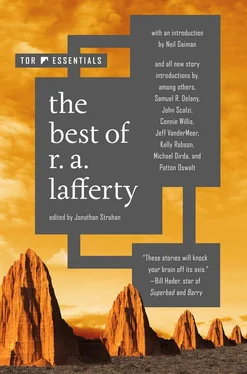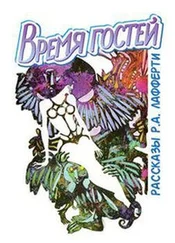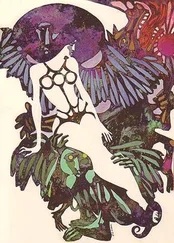Albert and Little Danny went to call on Alice.
“Why, he’s wonderful,” Alice said. “Why can’t you be like that, Albert? Aren’t you wonderful, Little Danny. Why do you have to be so stupid, Albert, when Little Danny is so wonderful?”
“I, uh, uh, I don’t know,” Albert said, “uh, uh, uh.”
“He sounds like a fish with the hiccups,” Little Danny said.
“You do, Albert, really you do!” Alice screamed. “Why can’t you say smart things like Little Danny does, Albert? Why are you so stupid?”
This wasn’t working out very well, but Albert kept on with it. He programmed Little Danny to play the ukulele and to sing. He wished that he could program himself to do it. Alice loved everything about Little Danny, but she paid no attention to Albert. And one day Albert had had enough.
“Wha-wha-what do we need with this dummy?” Albert asked. “I just made him to am—to amu—to make you laugh. Let’s go off and leave him.”
“Go off with you, Albert?” Alice asked. “But you’re so stupid. I tell you what. Let’s you and me go off and leave Albert, Little Danny. We can have more fun without him.”
“Who needs him?” Little Danny asked. “Get lost, Buster.”
Albert walked away from them. He was glad that he’d taken his logic machine’s advice as to the special thing to be built into Little Danny. Albert walked fifty steps. A hundred. “Far enough,” Albert said, and he pushed a button in his pocket.
Nobody but Albert and his logic machine ever did know what that explosion was. Tiny wheels out of Little Danny and small pieces of Alice rained down a little later, but there weren’t enough fragments for anyone to identify.
Albert had learned one lesson from his logic machine: never make anything that you can’t unmake.
Well, Albert finally grew to be a man, in years at least. He would always have something about him of a very awkward teenager. And yet he fought his own war against those who were teenagers in years, and he defeated them completely. There was enmity between them forever. Albert hadn’t been a very well-adjusted adolescent, and he hated the memory of it. And nobody ever mistook him for an adjusted man.
Albert was too awkward to earn a living at an honest trade. He was reduced to peddling his little tricks and contrivances to shysters and promoters. But he did back into a sort of fame, and he did become burdened with wealth.
He was too stupid to handle his own monetary affairs, but he built an actuary machine to do his investing and he became rich by accident. He built the damned thing too good and he regretted it.
Albert became one of that furtive group that has saddled us with all the mean things in our history. There was that Punic who couldn’t learn the rich variety of hieroglyphic characters and who devised the crippled short alphabet for wan-wits. There was the nameless Arab who couldn’t count beyond ten and who set up the ten-number system for babies and idiots. There was the double-Dutchman with his movable type who drove fine copy out of the world. Albert was of their miserable company.
Albert himself wasn’t much good for anything. But he had in himself the low knack for making machines that were good at everything.
His machines did a few things. You remember that anciently there was smog in the cities. Oh, it could be drawn out of the air easily enough. All it took was a tickler. Albert made a tickler machine. He would set it fresh every morning. It would clear the air in a circle three hundred yards around his hovel and gather a little over a ton of residue every twenty-four hours. This residue was rich in large polysyllabic molecules which one of his chemical machines could use.
“Why can’t you clear all the air?” the people asked him.
“This is as much of the stuff as Clarence Deoxyribonuclei-conibus needs every day,” Albert said. That was the name of this particular chemical machine.
“But we die of the smog,” the people said. “Have mercy on us.”
“Oh, all right,” Albert said. He turned it over to one of his reduplicating machines to make as many copies as were necessary.
You remember that once there was a teenager problem? You remember when those little buggers used to be mean? Albert got enough of them. There was something ungainly about them that reminded him too much of himself. He made a teenager of his own. It was rough. To the others it looked like one of themselves, the ring in the left ear, the dangling side-locks, the brass knucks and the long knife, the guitar pluck to jab in an eye. But it was incomparably rougher than the human teenagers. It terrorized all in the neighborhood and made them behave, and dress like real people. And there was one thing about the teenage machine that Albert made: it was made of such polarized metal and glass that it was invisible except to teenager eyes.
“Why is your neighborhood different?” the people asked Albert. “Why are there such good and polite teenagers in your neighborhood and such mean ones everywhere else? It’s as though something had spooked all those right around here.”
“Oh, I thought I was the only one who didn’t like the regular kind,” Albert said.
“Oh, no, no,” the people answered him. “If there is anything at all you can do about it—”
So Albert turned his mostly invisible teenager machine over to one of his reduplicating machines to make as many copies as were necessary, and set one up in every neighborhood. From that day till this the teenagers have all been good and polite and a little bit frightened. But there is no evidence of what keeps them that way except an occasional eye dangling from the jab of an invisible guitar pluck.
So the two most pressing problems of the latter part of the twentieth century were solved, but accidentally and to the credit of no one.
As the years went by, Albert felt his inferiority most when in the presence of his own machines, particularly those in the form of men. Albert just hadn’t their urbanity or sparkle or wit. He was a clod beside them, and they made him feel it.
Why not? One of Albert’s devices sat in the President’s Cabinet. One of them was on the High Council of World-Watchers that kept the peace everywhere. One of them presided at Riches Unlimited, that private-public-international instrument that guaranteed reasonable riches to everyone in the world. One of them was the guiding hand in the Health and Longevity Foundation which provided those things to everyone. Why should not such splendid and successful machines look down on their shabby uncle who had made them?
“I’m rich by a curious twist,” Albert said to himself one day, “and honored through a mistake in circumstance. But there isn’t a man or a machine in the world who is really my friend. A book here tells how to make friends, but I can’t do it that way. I’ll make one my own way.”
So Albert set out to make a friend.
He made Poor Charles, a machine as stupid and awkward and inept as himself. “Now I will have a companion,” Albert said, but it didn’t work. Add two zeros together and you still have zero. Poor Charles was too much like Albert to be good for anything.
Poor Charles! Unable to think, he made a—( but wait a moleskin-gloved minute here, Colonel, this isn’t going to work at all )—he made a machi—( but isn’t this the same blamed thing all over again? )—he made a machine to think for him and to—
Hold it, hold it! That’s enough. Poor Charles was the only machine that Albert ever made that was dumb enough to do a thing like that.
Well, whatever it was, the machine that Poor Charles made was in control of the situation and of Poor Charles when Albert came onto them accidentally. The machine’s machine, the device that Poor Charles had constructed to think for him, was lecturing Poor Charles in a humiliating way.
Читать дальше




![Рафаэль Лафферти - Дни, полные любви и смерти. Лучшее [сборник litres]](/books/385123/rafael-lafferti-dni-polnye-lyubvi-i-smerti-luchshe-thumb.webp)
![Рафаэль Лафферти - Лучшее [Сборник фантастических рассказов]](/books/401500/rafael-lafferti-luchshee-sbornik-fantasticheskih-ra-thumb.webp)